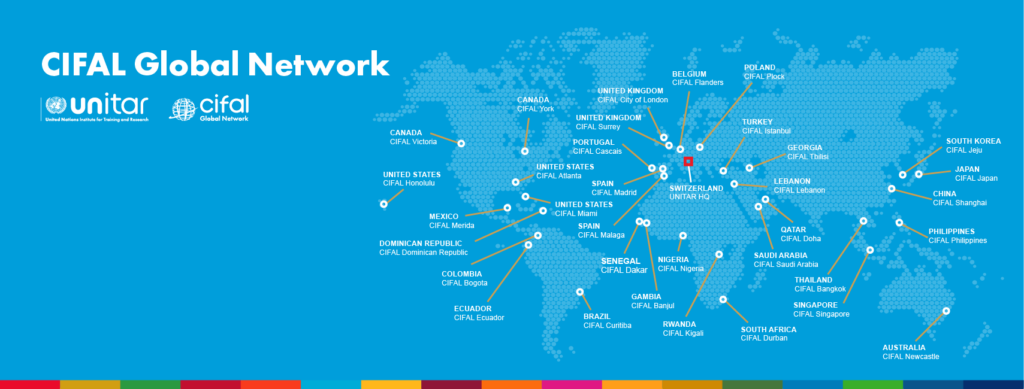
CIFAL stands for "Centre International de Formation des Autorités et Leaders" (in French), and "Centro Internacional de Formación para Autoridades y Líderes" (in Spanish).
The CIFAL Global Network is composed of 31 International Training Centres for Authorities and Leaders. These CIFAL centres are located across Asia, Oceania, Africa, Europe, the Americas and the Caribbean, and the network is coordinated by UNITAR’s Social Development Programme (SDP).
Most of SDP’s training services are delivered through the CIFAL Global Network.
The CIFAL centres provide innovative training throughout the world and serve as hubs for the exchange of knowledge amongst government officials, the private sector and civil society.
The eradication of poverty, hunger, environmental sustainability, risk reduction of natural disasters and provision of skills required to compete in a global economy, are only a few of the challenges that our governments and societies face.
The CIFAL Global Network recognizes that there is a crucial need for capacity development in order to address these challenges.
The CIFAL Global Network’s mission is to strengthen the capacities of government officials and civil society leaders, thus empowering them to advance sustainable development.
While working together, the CIFAL centres address a wide range of issues, including:
- Sustainable development and poverty eradication
- Decentralized cooperation
- Environmental sustainability
- Urbanization
- Gender equality
- Health security
- Public-private partnerships
More information about the CIFAL Global Network, please view our CIFAL Global Network page, as well as the dedicated pages for the affiliated individual centers.
There may be one near you!
The CIFAL Approach
The central purpose of the CIFAL training programmes is to develop and strengthen human capacities to better respond to development challenges and to facilitate City-to-City (C2C) partnerships. The CIFAL alliance provides a platform for dialogue and knowledge transfer on key development related issues. Through knowledge management methodologies, CIFALs provide networking opportunities that lead to collaboration, facilitation of peer-to-peer learning and exchange of best practices.
The CIFAL network was launched in 2003 and since inception has had significant impact on reaching beneficiaries world-wide. In 2020 alone, the network reached more than 87,000 beneficiaries through 236 learning events.
"[The CIFAL Network] meets a crucial need to reinforce capacities and exchange good practices among local authorities, the private sector and the United Nations”. United Nations Secretary-General Ban Ki-moon, Remarks to the UNITAR/CIFAL Network Steering Committee, Atlanta, USA, 8 May 2008
Target Audience
Primary beneficiaries are government officials from developing countries that are committed to taking a strategic approach to development. Beneficiaries include:
- Public officials from national, sub-national and local governments
- Academics
- Non-governmental organizations (NGOs)
- Community-based organizations(CBOs)
- Private sector representatives
- International organizations
CIFAL Global Network Centres
- CIFAL Atlanta (United States)
- CIFAL Bangkok (Thailand)
- CIFAL Banjul (Gambia)
- CIFAL Bogota (Colombia)
- CIFAL Cascais (Portugal)
- CIFAL Curitiba (Brazil)
- CIFAL Dakar (Senegal)
- CIFAL Doha (Qatar)
- CIFAL Dominican Republic (Dominican Republic)
- CIFAL Durban (South Africa)
- CIFAL Ecuador (Ecuador)
- CIFAL Flanders (Belgium)
- CIFAL Honolulu (United States)
- CIFAL Istanbul (Turkey)
- CIFAL Jeju (South Korea)
- CIFAL Kigali (Rwanda)
- CIFAL Lebanon (Lebanon)
- CIFAL City of London (United Kingdom)
- CIFAL Madrid (Spain)
- CIFAL Malaga (Spain)
- CIFAL Merida (Mexico)
- CIFAL Newcastle (Australia)
- CIFAL Philippines (Philippines)
- CIFAL Plock (Poland)
- CIFAL Saudi Arabia (Saudi Arabia)
- CIFAL Shanghai (China)
- CIFAL Singapore (Singapore)
- CIFAL Tbilisi (Georgia)
- CIFAL Victoria (Canada)
- CIFAL York (Canada)
- UNITAR HQ (Switzerland)
